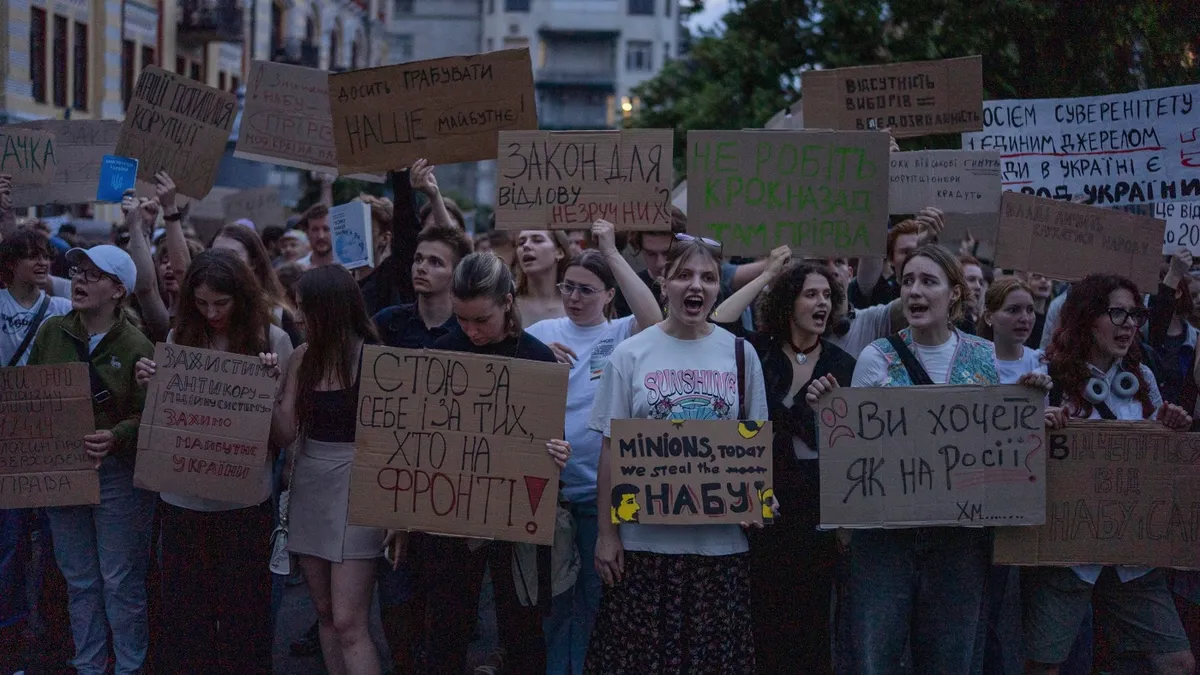
On Tuesday, thousands of people gathered in Kyiv and cities across Ukraine to demand that President Volodymyr Zelenskyy veto a controversial bill threatening the nation's anti-corruption infrastructure. This marked the first significant rally against the government since the onset of the ongoing war over three years ago. The Ukrainian parliament, known as the Rada, recently passed legislation designed to tighten oversight of two crucial anti-corruption agencies. Critics argue that this could substantially undermine their independence, thereby granting Zelenskyy’s administration increased influence over vital investigations.
According to the parliament's website, Zelenskyy has signed the bill into law, igniting widespread public outrage. Many Ukrainians perceive this legislative move as a severe moral setback, even more impactful than the relentless Russian drone and missile assaults. The newly enacted changes would empower the prosecutor general with enhanced authority over investigations conducted by the National Anti-Corruption Bureau of Ukraine (NABU) and the Specialized Anti-Corruption Prosecutor's Office (SAPO). Should this law take effect, the head of SAPO could become a mere figurehead, while NABU risks losing its autonomy, effectively transforming into an extension of the prosecutor general's office, according to a joint statement issued by the agencies on Telegram.
In light of these developments, the European Union's Enlargement Commissioner, Marta Kos, expressed deep concern over the parliament's vote. She labeled it a serious step back for Ukraine, emphasizing the importance of independent bodies like NABU and SAPO in Ukraine's aspirations for EU membership. Kos reiterated that the rule of law remains central to the EU accession negotiations, highlighting the significant implications of undermining anti-corruption efforts.
While protests have occurred during the war, they have primarily focused on issues such as the return of prisoners of war and the plight of missing individuals. However, public protests are a historical form of pressure in Ukraine, having successfully fueled two previous revolutions. Ihor Lachenkov, a prominent blogger and activist with over 1.5 million followers on social media, stated, “Corruption is a problem in any country, and it must always be fought.” He stressed that Ukraine, with its limited resources compared to Russia, cannot afford to misallocate its assets or allow them to be siphoned off by corrupt individuals.
The Ukrainian branch of Transparency International has publicly condemned the parliament's decision, asserting that it undermines one of the most significant reforms since the Revolution of Dignity in 2014. They cautioned that this move could erode trust with international partners and urged President Zelenskyy to veto the law. Otherwise, they warned, he would share culpability with the Rada for dismantling Ukraine's crucial anti-corruption framework.
During the protests, demonstrators carried signs with messages such as “Veto the law,” “Protect the anti-corruption system,” and “Protect Ukraine's future.” The atmosphere was charged with anger and frustration, reflecting the sentiments of war-weary Ukrainians. Some protesters criticized the leadership for prioritizing loyalty and personal connections over the fight against corruption. Veteran Oleh Symoroz, who was injured in 2022 and now uses a wheelchair, lamented that those sworn to uphold the law have chosen to shield their inner circle, jeopardizing Ukrainian democracy. He stated, “Instead of setting an example of zero tolerance for corruption, the president is using his power to control criminal cases involving his allies.”
In a related development, Ukraine’s domestic security agency detained two NABU officials on suspicion of having ties to Russia and conducted searches of other agency employees on separate, unrelated allegations. This action further complicates the landscape of Ukraine's anti-corruption efforts and adds to the urgency surrounding the current protests.